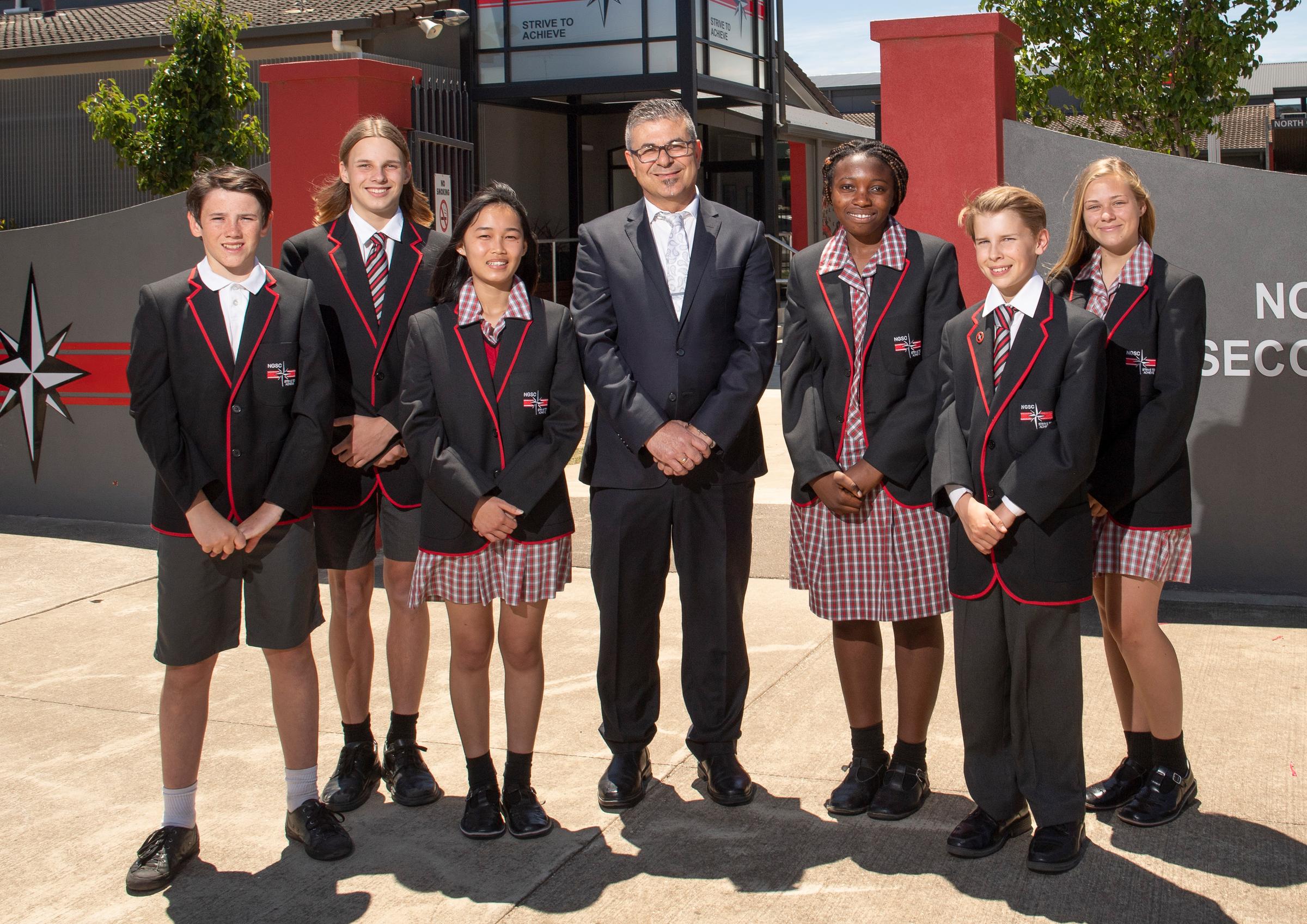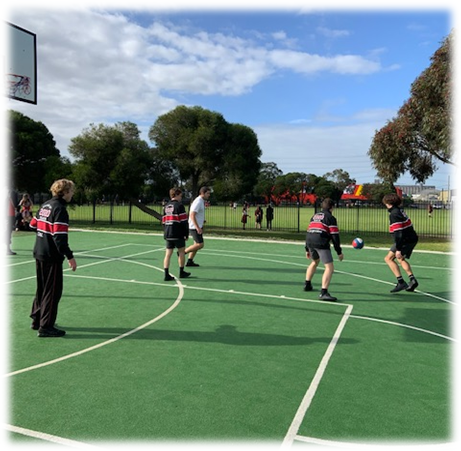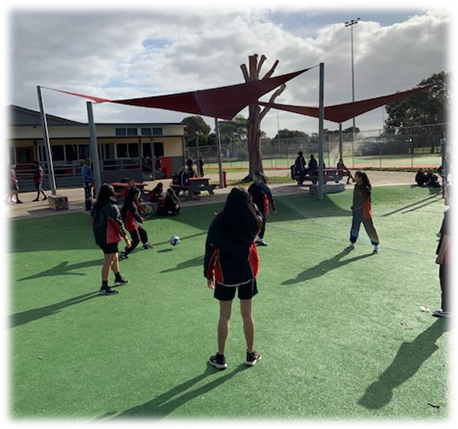
PRINCIPAL'S REPORT
Mr Nicholas Adamou
Principal
Key Dates
| Friday, 26 June | End Term Two, 1:30 pm finish |
| Friday, 26 June | Semester 1 Reports Published |
| Monday, 13 July | Term Three return to school |
Tuesday, 28 July (To be confirmed) | Parent Teacher Interviews 12 pm - 7 pm (To be Confirmed) |
| Thursday, 29 October | Year 12 Graduation The Pier (Waterfront) |
All students returned back to on-site learning
It was wonderful to welcome back our Year 7 to 10 students on Tuesday, 9 June, to join our senior students and witness the excitement and joy that marked the first interactions with their peers and teachers. The school yard has come completely alive and we are particularly thrilled with the way in which our students have transitioned back to their classes and study.
End of Term 2
The end of Term 2 of this academic year is fast approaching. I take this opportunity to celebrate with you and your families the achievements of our students and staff, in particular this year, with all the challenges we have been presented with during these unprecedented times.
None of this could have occurred without the hard work and effort of the staff (teaching and non-teaching), the students and of course the parents who have been amazing in supporting the remote and flexible learning. Congratulations to the whole school community who worked diligently, in a synchronised manner to plan and organise the remote and flexible learning. Also, the return to on-site learning has been very successful.
As I scan through the past newsletters, I can’t help being extremely proud of the personal qualities and achievements of our students, parents and staff during this very unusual semester.
Term Three begins on Monday, 13 July.
Child Safe Standards: Creating a safe environment
North Geelong SC is a child safe school/organisation that aims to comply with Ministerial Order No. 870 - Child Safe Standards, which came into effect 1 August, 2016.
The school is committed to the safety and wellbeing of all children and young people and this is the primary focus of our care and decision-making. We have a zero tolerance for child abuse.
NGSC is committed to providing a child safe environment where children and young people are safe and feel safe, and their voices are heard about decisions that affect their lives. Particular attention is paid to the cultural safety of Aboriginal children and children from culturally and/or linguistically diverse backgrounds, as well as the safety of children with a disability.
Every person involved in NGSC has a responsibility to understand the important and specific role he/she plays, individually and collectively, to ensure that the wellbeing and safety of all children and young people is at the forefront of all they do and every decision they make.
In addition, the school has a Wellbeing Centre with a number of full time staff members working with the students ensuring they are building resilience skills and having their wellbeing needs addressed. Together with the Doctors in Schools program the school wellbeing team work with a number of external agencies and organisations utilising their expertise to improve our students’ wellbeing and ensure they feel safe and are able to be productive in a caring learning and teaching environment.
Child Safety Code of Conduct
NGSC is committed to the safety and wellbeing of children and young people. Our school community recognises the importance of, and a responsibility for, ensuring our school is a safe, supportive and enriching environment which respects and fosters the dignity and self-esteem of children and young people, and enables them to thrive in their learning and development.
This Code of Conduct aims to protect children and reduce any opportunities for child abuse or harm to occur. It also assists in understanding how to avoid or better manage risky behaviours and situations. It is intended to complement child protection legislation, Department policy, school policies and procedures and professional standards, codes or ethics as these apply to staff and other personnel.
The Principal and school leaders of NGSC support the implementation and monitoring of the Code of Conduct, and will plan, implement and monitor arrangements to provide inclusive, safe and orderly school and other learning environments. The Principal and school leaders will also provide information and support to enable the Code of Conduct to operate effectively.
All staff, contractors, volunteers and any other member of the school community involved in child-related work are required to comply with the Code of Conduct by observing expectations for appropriate behaviour below. The Code of Conduct applies in all school situations, including school camps and in the use of digital technology and social media.
Acceptable behaviours
As staff, volunteers, contractors, and any other member of the school community involved in child-related work individually, we are responsible for supporting and promoting the safety of children by:
- upholding the school’s statement of commitment to child safety at all times
- treating students and families in the school community with respect both within the school environment and outside the school environment as part of normal social and community activities
- listening and responding to the views and concerns of students, particularly if they are telling you that they or another child has been abused or that they are worried about their safety/the safety of another child
- promoting the cultural safety, participation and empowerment of Aboriginal and Torres Strait Islander students
- promoting the cultural safety, participation and empowerment of students with culturally and/or linguistically diverse backgrounds
- promoting the safety, participation and empowerment of students with a disability
- reporting any allegations of child abuse or other child safety concerns to the school’s leadership team
- understanding and complying with all reporting or disclosure obligations (including mandatory reporting) as they relate to protecting children from harm or abuse.
- if child abuse is suspected, ensuring as quickly as possible that the student(s) are safe and protected from harm.
Unacceptable behaviours
As staff, volunteers, contractors, and any other member of the school community involved in child-related work we must not:
- ignore or disregard any concerns, suspicions or disclosures of child abuse
- develop a relationship with any student that could be seen as favouritism or amount to ‘grooming’ behaviour (for example, offering gifts)
- exhibit behaviours or engage in activities with students which may be interpreted as abusive and not justified by the educational, therapeutic, or service delivery context
- ignore behaviours by other adults towards students when they appear to be overly familiar or inappropriate
- discuss content of an intimate nature or use sexual innuendo with students, except where it occurs relevantly in the context of parental guidance, delivering the education curriculum or a therapeutic setting
- treat a child unfavourably because of their disability, age, gender, race, culture, vulnerability, sexuality or ethnicity.
- communicate directly with a student through personal or private contact channels (including by social media, email, instant messaging, texting, etc) except where that communication is reasonable in all the circumstances, related to school work or extra-curricular activities or where there is a safety concern or other urgent matter
- photograph or video a child in a school environment except in accordance with school policy or where required for duty of care purposes
- in the school environment or at other school events where students are present, consume alcohol contrary to school policy or take illicit drugs under any circumstances.
Some ways parents/carers can encourage and support your young person’s mental health and wellbeing:
1. Encourage them to stay connected
Social relationships are important to your young person’s general wellbeing. It is okay if they take time out for themselves at times but encourage them to keep in contact with friends.
Friends can provide both play and support, and spending time with friends is also important for keeping and building on existing friendships. During restrictions, young people can remain connected via phone call, email, text message Facebook message, Zoom meetings or House Party app.
2. Encourage them to stay involved
Encourage involvement with volunteer work, hobbies, clubs or committees, or sports – these can help young people feel connected to their wider community. Participate with them when you can. Involve them in decisions and give them responsibility at home (eg making decisions about dinner and helping to prepare dinner). Help them to identify and set realistic goals. Setting and achieving realistic goals can be incredibly motivating and can help build self-confidence.
3. Encourage physical activity
Physical activity is important for everyone’s health and wellbeing. If your young person is feeling down or finding things are difficult, physical activity may be the last thing they feel like doing. But even small activities, like walking around the block, can help relieve stress and frustration, provide a good distraction from worrying thoughts, improve concentration and improve mood. If your young person is struggling to get active, find a physical activity that you both enjoy and can do together and plan to do it regularly.
4. Encourage a regular routine
Getting a good night’s sleep helps young people to feel energised, focused and motivated. Adolescence is a time when a number of changes to the “body clock” impact on sleeping patterns and young people are more likely to have problems with sleep. Developing a sleeping routine can help. Encourage your young person to wake up around the same time each day, get out of bed when they wake up and go to bed around the same time each night. Avoiding caffeine after lunchtime, having a quiet, dark and uncluttered bedroom and shutting down electronic devices before bed can also help them to get a good night’s sleep.
5. Encourage healthy eating habits
Eating well doesn’t only reduce the risk of physical health problems, like heart disease and diabetes, but it can also help with sleeping patterns, energy levels, mood, and general health and wellbeing. A good balanced diet with less junk food, less sugar and more vegetables, fruit, whole grains and plenty of water will ensure your young person has all of the vitamins and minerals to help their body and brain function well.
6. Encourage play
Devoting time to just having fun can help to recharge your young person’s battery, revitalise their social networks and reduce stress and anxiety.
Student accident insurance, ambulance cover arrangements and private property brought to schools
Parents and Guardians are reminded that the Department does not provide personal accident insurance or ambulance cover for students.
Parents and guardians of students, who do not have student accident insurance/ambulance cover, are responsible for paying the cost of medical treatment for injured students, including the cost of ambulance attendance/transport and any other transport costs.
In some circumstances, medical or other expenses will be paid by the Department where it is assessed that it is likely, in all the circumstances, that the Department is liable for negligent (careless) acts or omissions of its staff/volunteers.
Student accident insurance/ambulance cover policies are available from some commercial insurers, and can be obtained by school councils on a whole-of-school basis, or by parents/guardians for individual students.
Private property brought to school by students, staff or visitors is not insured and the Department does not accept any responsibility for any loss or damage.



